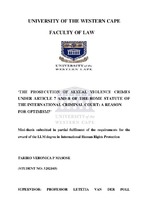| dc.contributor.advisor | Van Der Poll, Letetia | |
| dc.contributor.author | Masose, Tariro Veronica P. | |
| dc.date.accessioned | 2018-03-22T11:13:48Z | |
| dc.date.available | 2018-04-30T22:10:07Z | |
| dc.date.issued | 2018 | |
| dc.identifier.uri | http://hdl.handle.net/11394/5831 | |
| dc.description | Magister Legum - LLM (Public Law and Jurisprudence) | |
| dc.description.abstract | The Rome Statute gave birth to the International Criminal Court (ICC) on 17 July 1998. Its mandate is to assist the international community in the arduous task of closing the gap of impunity for the most heinous crimes, namely war crimes, crimes of aggression, genocide and crimes against humanity. For the first time in the history of humankind, States accepted the jurisdiction of a permanent international criminal court, for the prosecution of the perpetrators of the most serious crimes committed within their territories or by nationals after the entry into force of the Rome Statute on 1 July 2002. The ICC is an international organization, with distinct legal capacity. It is independent of the United Nations although it does act in close association with it. The ICC is not a substitute for national courts. The Rome Statute provides that it is still very much the duty of the State to exercise its jurisdiction over those responsible for international crimes. The ICC can only intervene as a court of last resort where a State is unwilling or unable to carry out the investigation and prosecute the perpetrators within its own domestic courts and laws. It may only exercise jurisdiction over crimes committed on the territory of a State party or a national of such, the only exception to this is that the United Security Council can use its powers under the UN Charter to refer situations to the Prosecutor of the ICC. The ICC is therefore meant to compliment and support domestic criminal justice; this was reflected even in the drafting stages of the Statute whereby integration of a variety of national perspectives and judicial cultures from different countries was considered in order to ensure that the ICC did not depart from what is considered just within the domestic sphere. It may well be argued that the Rome Statute provides an opportunity to reinvigorate and reform criminal codes which may in the long term globally strengthen the rule of law, peace and security. | |
| dc.language.iso | en | |
| dc.publisher | University of the Western Cape | |
| dc.title | The Prosecution of sexual violence crimes under article 7 and 8 of the rome statue of the international criminal court: A reason for optimism?' | |
| dc.rights.holder | University of the Western Cape | |

